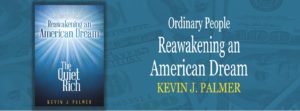Noted author and scholar R.R. Reno said, “From the end of the Civil War until the 1960s, the wealthiest, best educated, and most powerful Americans remained largely loyal to Christianity (but) that’s changed…”
He was not alone in arguing that material attainment and ethics are often mutually exclusive. Growing rich, is demonstrably under attack, especially for Christians who are competing with spiritual values from within that add to usual financial challenges.
Yes, among rich Americans many are still loyal to Christianity but outside this circle, the greed-is-good group grows. Some saying that getting rich requires a lack of standards. Worldwide, there is reshaping of the wealth attainment playing field. New lines of fair and foul are being drawn, and in some cases simply rubbed away till indiscernible. Upward-bound Americans are becoming rudderless when navigating the morals and ethics of business. In too many instances, getting rich at any cost has gained the spotlight and edged out the tradition of earning it!
I think it is fair to say competing against the new way the world accumulates wealth makes Christians feel they are at a disadvantage and influences the way they think about possessing wealth. Thus they default to societal conditioning —preached from the pulpit of the presidency, legislated in congress, and festooned on automobile bumpers—that undermines their true opportunity.
A giant step into the roiling arena of public opinion is to push back and proclaim: Money is not inherently evil. Those who secure wealth with old-fashioned hard work and disciplined efforts, are likewise worthy of inheriting the earth along with the meek. In other words, “You DID build that, quietly and well, along with the help of Christian values. Congratulations—you’re an inspiration to all!”
* * *
Let us not forget that America was founded upon freedoms and the dream to prosper—buttressed by Christian values that inspired the most dynamic form of capitalism in history. Our freedoms, of speech and the press and the right of the people to peaceably assemble, were intended for us to, “secure the Blessings of liberty to ourselves and our Posterity,” which is the underling precept of American free enterprise.
As early as 1758 Benjamin Franklin, was writing about Ways to Wealth even before he helped pen the Declaration of Independence. Intended or not Christian values were intuitively woven into the fabric of this nation’s founding documents by its authors. They were, and remain, a driving force that helped to make this country great.
Christianity was the common religion among the founders of this republic and as do most fathers they expected religion to be descendant. In a letter to Benjamin Rush, John Adams said, “It is religion and morality alone which can establish the principles upon which freedom can securely stand.”
It also states thoughtfully in the Declaration of Independence that the“government was designed and upheld by people” assuming all races and creeds. Making it indelibly clear the founding fathers intended to pave the ways to freedoms and wealth, “…to which the Laws of Nature and of Nature’s God entitle…”.
* * *
Rich was never a four-letter word as some would have Christians believe. Love of money may be the path to perdition but money for love allows those who acquire it to share it, in quantifiable executions of charitable giving. Yes, being saved can include having material wealth! Without it a rich man could have not provided a tomb for Jesus to rise from, nor would it today feed many who hunger and thirst around the globe.
There are people who work to deny the powerful cornerstones that shaped the dream of our founders and subsequent economic greatness their beliefs reaped. But America’s economic formula, which includes Christian values, remains a proven fact in financial prosperity. Wealth is a blessing that can be possessed without a fall from grace and achieved in good faith.
Kevin J. Palmer
The Quiet Rich


